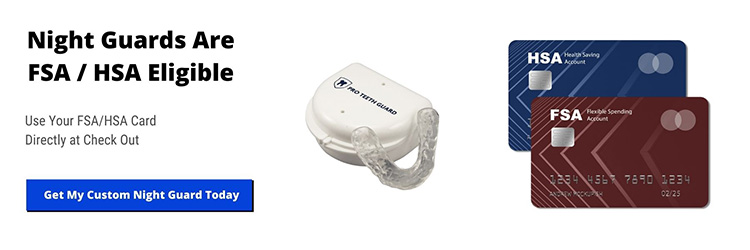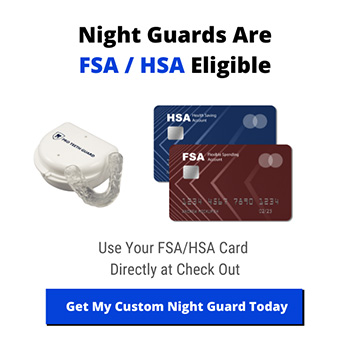Are Night Guards FSA / HSA Eligible?
2nd Jan 2021

Night guards aren’t cheap—some dental offices charge close to $1,000 for them. If you're experiencing jaw pain from teeth clenching and grinding, finding an affordable way to get that dental appliance and relief is crucial. Many individuals wonder if their Flexible Spending Account (FSA) or Health Savings Account (HSA) will cover the costs associated with night guards, which often include dentist visits and custom orders. In other words are night guards FSA / HSA eligible?
Many insurance plans don’t cover the cost of a night guard. If you're looking for ways to finance your night guard purchase, it's good to know that the IRS qualifies these dental appliances as eligible medical expenses under most Flexible Spending Accounts (FSA) and Health Savings Accounts (HSA). These accounts can cover the expenses, making it a great opportunity to utilize your LPFSA for dental health investments.
Qualifying individuals can use these tax-free funds to pay for out-of-pocket health care costs. With Pro Teeth Guard, you can conveniently use your FSA or HSA card directly at checkout.
Dental Night Guard FSA And HSA Eligibility
Good news! If you have an FSA (Flexible Spending Account) or HSA (Health Savings Account), you might be able to use it to pay for dental products.
When considering the benefits of night guards, eligibility for Flexible Spending Accounts (FSA) and Health Savings Accounts (HSA) can provide financial protection so you can invest in your oral health without straining your budget.
These accounts allow you to use pre-tax dollars to cover medical expenses, which means you’re not only protecting your teeth from damage caused by grinding or clenching but also saving money in the process.
Whether it’s a custom night guard from your dentist or one you purchase online, using FSA or HSA funds can make the cost much more manageable while improving your dental health.
What Can You Use Your FSA/HSA For?
Medical and Dental Expenses: Your FSA or HSA can be used to cover certain medical and dental costs for you, your spouse, or dependents.
Night Guard Eligibility: Night guards for conditions like TMJ or bruxism (teeth grinding) are usually considered eligible expenses. This includes:
- Dentures
- Occlusal guards (another term for mouth guards)
- Over-the-counter and custom night guards for teeth grinding
What Should You Check?
Your Plan’s Details: It’s always a good idea to review your specific FSA or HSA plan to confirm what expenses are covered. While most plans include night guards for issues like bruxism or TMJ, coverage details can vary from one plan to another.
Make sure to check the list of eligible expenses, which is usually available online or through your plan administrator. This way, you can be certain that your night guard is covered before making the purchase, avoiding any surprises during the reimbursement process.
What’s Not Covered?
Dependent Care FSAs: It’s important to note that night guards or occlusal guards are not eligible for expenses under DCFSA. These accounts are specifically designed to cover costs related to childcare or elder care, not medical or dental expenses. If you’re looking to purchase a night guard, make sure you’re using a standard FSA or HSA that allows for medical expenses, as Dependent Care FSAs won’t cover this type of purchase.
Related Articles:
- Does Medicare and Medicaid Cover Night Guards?
- Night Guard Dental Insurance Code
- Guide to Choosing the Right Night Guard
How To Use Your FSA Or HSA
Once you’ve confirmed that your dental night guard is an eligible expense under your FSA or HSA, using those funds is usually straightforward. Here are some tips:
Paying With Your FSA/HSA Card:
FSA/HSA Debit Card: Many cases of FSA and HSA accounts come with a debit card you can use to purchase eligible items directly to the shop. Simply swipe your card at checkout, just like you would with a regular debit or credit card. Be sure to keep your receipt for record-keeping purposes and potential reimbursement.
- Submit a Claim: If you don’t have an FSA/HSA debit card or if the amount of your night guard is more than what’s on your card, you can also submit a claim for reimbursement. This usually involves filling out a form provided by your company or plan administrator and attaching a copy of the receipt from your purchase.
- Reimbursement Timeframe: The timeframe for reimbursement can vary depending on your specific plan and how quickly they process claims. Typically, it can take anywhere from 1-3 weeks to receive reimbursement.
Online Retailer Checkout: Purchasing your night guard from an online store like Pro Teeth Guard is simple and hassle-free. At checkout, you can easily enter your FSA or HSA card details to cover the cost. If the total price of the night guard exceeds the balance on your FSA/HSA card, don't worry—you can split the payment.
Save Your Receipts: Keep any receipts or documentation in case your employer or insurance provider asks for proof. You might also need a note from your dentist to confirm the purchase was a medical necessity.
Tips: When ordering a night guard online, be sure to check if your flexible spending account (FSA) or health savings account (HSA) covers the cost, including any shipping fees that may apply.

What If You Don’t Have a Debit Card?
No worries if your FSA or HSA doesn’t come with a debit card! You can still get reimbursed by following these 5 simple steps:
- Buy Your Night Guard: Pay for your night guard out of pocket using your preferred method, such as a credit card, bank transfer, or any other option that suits you.
- Keep Your Documents: Be sure to save your receipt, along with any necessary paperwork. If your plan requires it, you might also need a note from your dentist confirming that the night guard is medically necessary. Additionally, hold onto any proof that the night guard wasn’t covered by insurance.
- Submit Your Claim: Log into your FSA or HSA portal and upload the required documents. Fill in all the details, such as the amount you’re claiming, and make sure everything is accurate before submitting.
- Get Reimbursed: After your claim has been reviewed and approved by your plan administrator, the reimbursement will be deposited directly into your FSA or HSA account.
- Track Your Claim: Keep checking the status of your claim through your portal. Most claims are processed within a few days, but it’s always a good idea to stay on top of it just in case any additional information is needed.
Important Tip: To take advantage of your Health Savings Account (HSA) or Flexible Spending Account (FSA) benefits, it's essential to obtain a doctor’s recommendation in order to cover the cost of your night guard.
Related Articles:
What’s the Difference Between FSA and HSA When It Comes to Medical Devices Like Night Guards?
Many individuals are finding that their night guard purchases can be covered under Flexible Spending Accounts (FSA) or Health Savings Accounts (HSA), making it a financially savvy choice for maintaining oral health. Both FSAs (Flexible Spending Accounts) and HSAs (Health Savings Accounts) can help you save money on medical expenses like night guards. But, they do work a little differently. Here’s a simple breakdown:
How Much Can You Contribute?
- FSA: You can add a certain amount each year (your employer sets the limit), but most of the money needs to be used by the end of the year, unless your plan lets you roll over some of it or gives you extra time.
- HSA: You can contribute more than an FSA allows, and the best part—any unused money rolls over to the next year, so you don’t lose it if you don’t spend it.
Who Can Get One?
- FSA: You’ll need to sign up through your employer’s healthcare plan.
- HSA: You can get an HSA only if you have a high-deductible health plan (HDHP).
What Happens If You Leave Your Job?
- FSA: If you leave your job, you’ll usually lose access to any unused FSA money, unless you spend it first.
- HSA: Your HSA is yours to keep—whether you change jobs or retire, the money stays with you.
Tax Perks?
- FSA: You don’t pay taxes on the money you put into your FSA, which lowers your taxable income. But remember, you need to use most of it by year-end.
- HSA: With an HSA, you get triple tax advantages: your contributions are tax-deductible, any growth is tax-free, and you can use the money for eligible expenses (like night guards) without paying taxes.
In short: Both FSA and HSA accounts can help you save on medical devices like night guards, but HSAs offer more flexibility—you get to keep your money year after year and take it with you if you leave your job.
What Is The Difference Between An FSA And An HSA?
Both accounts allow you to save your own money to later cover eligible medical and dental expenses. The most significant difference between an FSA and an HSA is who owns the account. With an HSA, you are the owner of the account and your contributions can roll over into the next year.
With an FSA, your employer owns the account and contributions typically do not roll over. This means you’ll want to be sure to use your balance before the year is over so you don’t lose it. If you’ve been hesitant to invest in a mouth guard and you have unused funds in your FSA, a night guard for bruxism is an excellent investment to relieve teeth grinding and jaw clenching pain.
FAQ’s
1. Can I use both my FSA and HSA to pay for a night guard?
No, you can’t use both accounts for the same expense. You can choose to pay for your night guard with either your FSA or HSA, but not both. If you use funds from one account, you cannot claim the same expense as the other.
2. Is there a limit to how much I can spend using my FSA or HSA for night guards?
Yes, but the limit is based on how much you can contribute to your FSA or HSA each year, rather than how much you can spend on a single night guard.
FSA (Flexible Spending Account)
For 2024, you can contribute up to $3,050 to your FSA. This is the total amount you can use for all eligible healthcare expenses, including night guards.
Just remember, FSAs are “use it or lose it”—most of the money needs to be spent by the end of the year, unless your plan lets you roll over some or gives you a grace period.
HSA (Health Savings Account)
If you have an HSA, the contribution limits are higher. For 2024, you can add up to $4,150 if you’re on an individual plan, or up to $8,300 if you have a family plan.
The best part? HSAs roll over year to year, so there’s no pressure to spend all your money by the end of the year.
In a nutshell: The amount you can spend on a night guard depends on how much you’ve contributed to your FSA or HSA. Be sure to keep an eye on your balance so you can budget your healthcare spending wisely! From a health and financial view, utilizing your FSA or HSA for a night guard can be a smart decision, allowing you to invest in your oral health while maximizing your savings.
3. What happens if I lose my receipt for the night guard?
If you lose your receipt, it may complicate the health reimbursement arrangement process. Some FSA or HSA providers require a detailed receipt for claims. You may want to contact your night guard provider (e.g., Pro Teeth Guard) to see if they can provide you with a copy of your receipt or proof of purchase. It’s always a good idea to keep digital copies of your receipts as backup.
4. Are there any special rules or limitations for using FSA/HSA for night guards?
Yes. Many dental providers and online retailers offer promotions specifically targeting night guards, making them even more accessible for those looking to leverage their FSA or HSA benefits. But there are 5 things to keep in mind when using your FSA or HSA for a night guard.
1. Is the Night Guard Eligible?
Most night guards for teeth grinding (bruxism) or TMJ are covered by FSA/HSA, but it’s always a good idea to check your plan’s list of eligible items to be sure.
2. Do You Need a Doctor’s Note?
Some plans might ask for proof that your night guard is medically necessary. This just means you may need a note from your dentist saying the night guard is important for your health.
3. Keep Your Receipts!
Make sure to save all receipts and documentation from your night guard purchase. If you need to file a claim for reimbursement, your plan will likely ask for these details.
4. What About Insurance?
Some plans may require a statement that shows your night guard wasn’t covered by insurance. This helps verify that you’re using your FSA or HSA for out-of-pocket expenses.
5. Dependent Care FSAs Don’t Apply
Keep in mind that Dependent Care FSAs, which are used for childcare or elder care expenses, can’t be used for medical items like night guards. Make sure you're using the right account!
Bottom line: While using your FSA or HSA for a night guard is generally easy, check your plan’s specific rules and keep all your documentation handy.
Conclusion
Many individuals may be pleased to discover that their Flexible Spending Accounts (FSA) or Health Savings Accounts (HSA) often offers coverage for the cost of night guards, making dental health more accessible and affordable.
Using your FSA or HSA to cover the cost of a night guard is a great way to save money while taking care of your dental health. Even though most insurance plans don’t cover night guards, your FSA or HSA can help you pay for one with tax-free dollars.
Just be sure to check your plan’s details, keep any necessary receipts, and, if needed, get a note from your dentist.
Whether you’re paying with an FSA/HSA card at checkout or submitting a claim for reimbursement, the process is usually pretty simple. With your night guard in hand, you can protect your teeth, reduce jaw pain, and save some money along the way!

- Most Popular
- Hard Outside, Soft Inside
- 2MM Thick
- Moderate / Heavy

- Most Durable
- Hard Materials
- 1.5MM Thick
- Heavy / Severe

- For Day Time Use
- Thin, Barely Visible
- 1MM Thick
- Light / Moderate

- For Clenching
- Flexible & Soft
- 1.5MM Thick
- Light / Moderate



